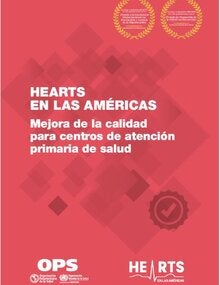Cardiovascular diseases, with hypertension as the most important risk factor, constitute the main cause of mortality and morbidity in the Region of the Americas. Despite progress, the downward trend in mortality from these diseases has slowed in most countries, and has even been reversed in some. This compromises the goal of a 30% reduction in premature mortality from noncommunicable diseases by 2030. To address these challenges, the HEARTS quality program in the Americas drives improvements in the structural conditions of health services. The program promotes the systematic implementation of key clinical and management processes, called drivers for hypertension control, and advocates the regular use of a monitoring and evaluation system. This system measures the maturity level of program implementation and performance in primary healthcare settings. Systematic implementation, including monitoring and evaluation of drivers of hypertension control, forms the core of the HEARTS quality improvement program. This document summarizes the fundamental elements for optimizing quality in primary healthcare centers. Its goal is to ensure that people receive effective, efficient, timely, equitable, ethical, and evidence-based care. It seeks to motivate and support primary care teams in their continuous efforts to improve quality, to impact the health of the populations they serve. |

